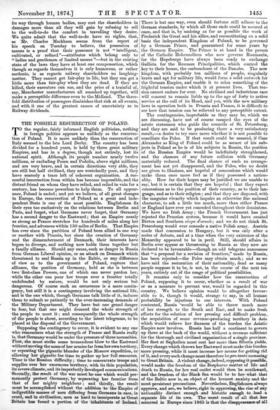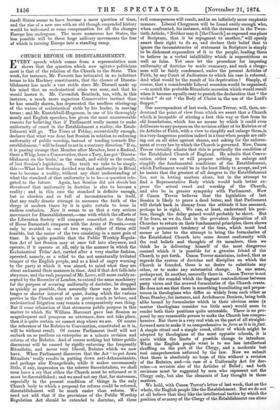THE POSSIBLE RES1TRRECTION OF POLAND.
TO the regular, fairly informed English politician, nothing in foreign politics appears so unlikely as the resurrec- tion of Poland. It is more unlikely than the resurrection of Italy seemed to the late Lord Derby. The country has been divided for a hundred years, is held by three great military Empires, and has in a degree, though not entirely, lost its national spirit. Although its people number nearly twelve millions, or excluding Posen and Podolia, above eight millions, and are very brave, and in certain directions very able' they are still but half civilised, they are wretchedly poor, and they have scarcely a trace left of coherent organisation. A suc- cessful insurrection from within has become impossible, and the distant friend on whom they have relied, and relied in vain for a century, has become powerless to help them. To all appear- ance, Poland is ended; and yet we believe, of all great changes in Europe, the resurrection of Poland as a great and inde- pendent State is one of the most possible. Englishmen fix their eyes too exclusively on the relations between Berlin and Paris, and forget, what Germans never forget, that Germany has a second danger to the Eastward ; that an Empire nearly as strong as Prance stretches for hundreds of miles along her frontier, and advances within 150 miles of Berlin. That Empire has ever since the partition of Poland been allied in one way or another with Prussia, but since the creation of Germany and the dismemberment of Denmark, their interests have begun to diverge, and nothing now holds them together but a family alliance. Should any cause, such as danger in Russia from German Liberal opinion, or an attack on Denmark which threatened to seal Russia up in the Baltic or any difference of view as to the government of Poland, rupture that alliance the position of Germany, held as she is between two first-class Powers, one of which can never pardon her, while the other can pour her troops over a frontier totally undefended by nature, would be not only serious but dangerous. Of course such an occurrence is a mere contin- gency, but still it is a contingency involving the national life, and is the one which, though Germans talk little of it, induces them to submit so patiently to the ever-increasing demands of the Military Department. They have but one grand danger to fear, but that one might demand the whole strength of the people to meet it ; and consequently the whole strength of the people is about, according to the latest telegrams, to be placed at the disposal of the Government.
Supposing the contingency to occur, it is evident to any one who remembers what the strength of France and Russia really is, that Germany would be under the pressure of three necessities. First, she must strike some tremendous blow to the Eastward without moving the mass of her armies far from her own territory, or repeating the gigantic blunder of the Moscow expedition, or allowing her gigantic foe time to gather up her full resources. Time is the Russian difficulty ; time to concentrate troops and supplies over her enormous territory, with its thin population, its severe climate, and its imperfectly developed communications. Secondly, the result of the war must be one which would per- manently protect Germany, by separating her frontier from that of her mighty neighbour ; and thirdly, the result must be accomplished without the addition to the Empire of indigestible masses of men differing from Germans in race, in creed, and in civilisation, men as hard to incorporate as Great Britain has found a portion of the inhabitants of Ireland.
There is but one way, even should fortune still adhere to the German standards, by which all those ends could be secured at once, and that is, by undoing as fax as possible the work of Frederick the Great and his allies, and reconstituting on a solid basis the independent Kingdom of Poland, to be governed by a German Prince, and guaranteed for some years by the German Empire. The Prince is at hand in the person of the Catholic Hohenzollern who now governs Roumania, for the Hapsburgs have always been ready to exchange Gallieia for the Rouman Principalities, which control the key to their house, the embouchure of the Danube. The new kingdom, with probably ten millions of people, singularly brave and apt for military life, would form a solid outwork for the German Empire, and enable it to relax something of the frightful tension under which it at present lives. That ten- sion cannot endure for ever. No civilised and industrious race will consent to remain liable up to the age of forty to active service at the call of its Head, and yet, with the new military laws in operation both in Prussia and France, it is difficult to see how that tension can be relieved to any perceptible extent.
The contingencies, improbable as they may be, which we are discussing, have not of course escaped the eyes of the astute statesmen who guide the councils of St. Petersburg, and they are said to be producing there a very satisfactory result,—a desire to try once more whether it is not possible to conciliate the Poles. If that result could be assured, if Czar Alexander as King of Poland could be as secure of his sub- jects in Poland as he is of his subjects in Russia, the position of the Russian Empire would be indefinitely strengthened, and the chances of any future collision with -Germany materially reduced. The final chance of such an arrange- ment has not yet disappeared, and the Poles, who no doubt are given to illusions, are hopeful of concessions which would make them once more feel as if they possessed a nation- ality. How far their hopes may be justified we are unable to say, but it is certain that they are hopeful ; that they expect concessions as to the position of their country, as to their lan- guage, and as to their religion ; and that they are disposed, with the sanguine vivacity which impairs an otherwise fine national character, to ask a little too much, more than either France or England have ever yet conceded throughout their dominions. We have no Irish Army ; the French Government has just rejected the Prussian system, because it would have created Breton and Southern corps dame's; and we do not think St. Petersburg would ever concede a native Polish army. Austria made that concession to Hungary, but it was only after a series of defeats, and at a time when the very existence of the Monarchy appeared to be in peril. Still, should affairs in Berlin ever appear as threatening to Russia as they now are declared to be favourable—though an odd telegram announces that "a proposal for a revision of frontiers," made by Russia, has been rejected—the Poles may obtain much ; and as we have said the restoration of their nationality, dead as many people suppose it to be, is not, in the course of the next ten years, entirely out Of the range of political possibilities.
It remains only to consider how the resurrection of Poland, supposing it to occur, whether as a result of war or as a measure to prevent war, would be regarded in this country. We believe opinion would be altogether favour- able to it, though it would, strange to say, in all human probability be injurious to our interests. With Poland contented, Russia 'would be able to throw much more of her strength to the South and East, and to make fresh efforts for the solution of her pressing and difficult problem, the acquisition of some revenue-producing territory in Asia which would relieve her finances of the burden the Asiatic Empire now involves. Russia has half a continent to govern up there at the back of the world, without a revenue sufficient for the thorough and civilised organisation of a single province. Her fleet at Saghalien must cost her more than Siberia yields. Every change which throws her Eastward must make this burden more pressing, while it must increase her means for getting rid of it, and every such change must therefore be pro tanto menacing- to Great Britain. A violent change, indeed, supposing it possible, would make the freedom of the Bosphorus matter of life and death to Russia, for her real outlet would then be southward, and the freedom of the Black Sea would be to her what that of the Baltic now is, an object of the keenest anxiety and the most persistent precautions. Nevertheless, Englishmen always approve, and are, we believe, right in approving, the rise of any nationality distinct enough and historic enough to lead a separate life of its own. The worst result of all that has occurred in Europe since 1865 is that the disappearance of all
small States seems to have become a mere question of time, and the rise of a new one with an old though suspended history would be welcomed as some compensation for all the changes Europe has undergone. The more numerous her States, the lees possible will be those huge military movements the fear of which is turning Europe into a standing camp.



































 Previous page
Previous page